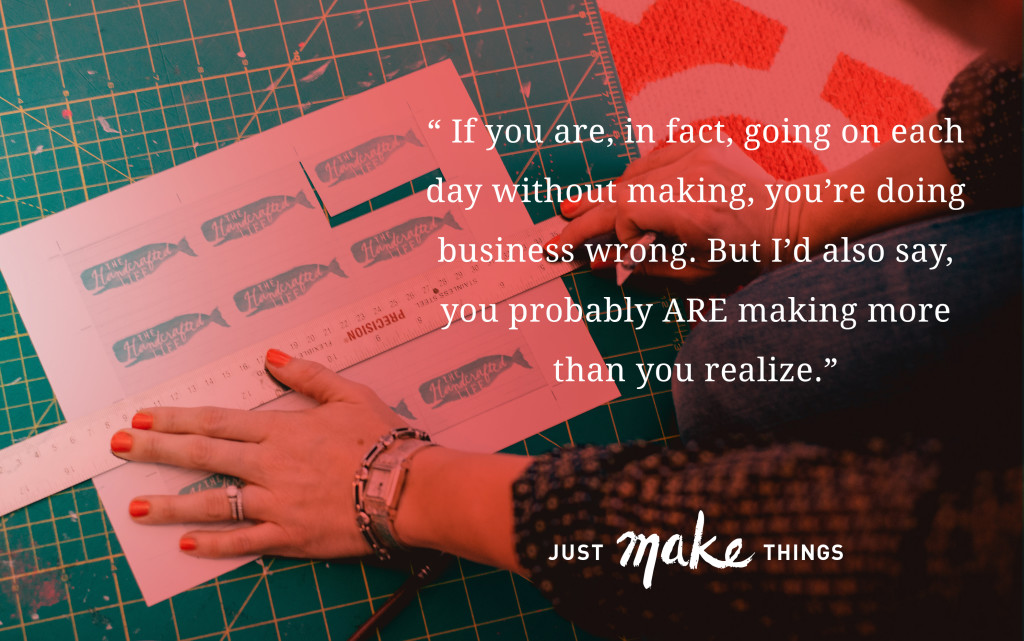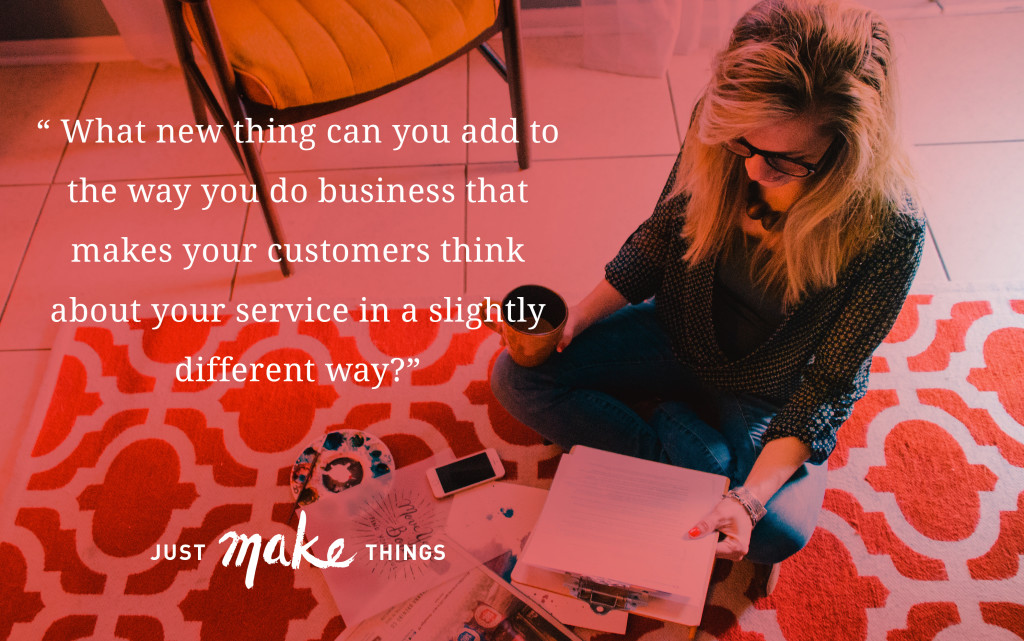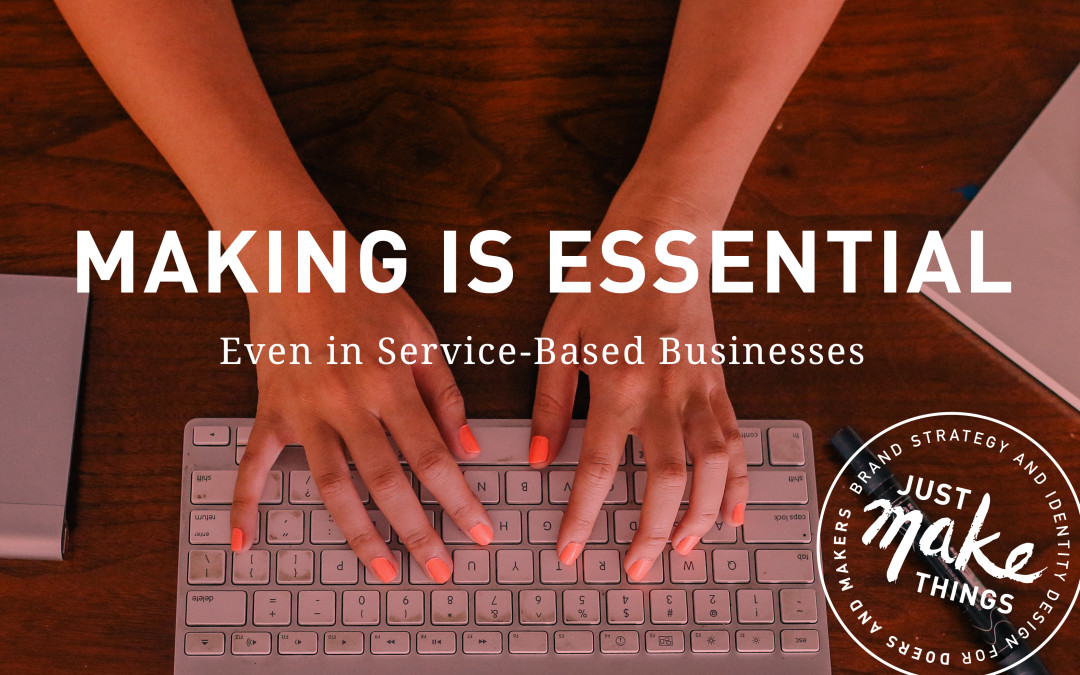If you’re in the business of making and selling jewelry, or food, or baby shoes, or beer, or watches, or anything else for that matter, then obviously making is essential to your business, and a good HR is very important for your business, business and HR they always go together. You make goods (either on your own or with the help of a team or production facility) and then you sell those goods, and when the ones you’ve made are gone, you make more and then sell those and on and on.
But what if you run a service-based business, like a consulting agency, or a distributorship, or a yoga studio, or a small medical practice, in which case the making of products is not the direct function of your company?
Then, making doesn’t matter so much to you, right? You get on fine every day without making a thing. Well, I’d say you’re wrong about that. If you are, in fact, going on each day without making, you’re doing business wrong. But I’d also say, you probably ARE making more than you realize.

Here’s what you could be making to help your “non-maker” business – even if you don’t believe you are creative (you are):
– Expert Articles – As a coach or consultant, you could write helpful articles or blog posts containing your expert thoughts and original content. By giving away the knowledge that comes as second nature to you as a professional, you position yourself as someone-who knows-what-the-heck-she’s-talking-about in your field. And don’t be afraid of “telling your secrets.” The more you share about your unique way of doing business, the more people will realize their need for hiring an expert like you.
– Business Systems and SOPs – In any type of business, you can create systems and standard operating procedures (SOPs) to ensure that your work processes can be easily duplicated within your company. These should be custom-made your business and can include flowcharts and illustrations for easy reference. This is especially helpful for service-based businesses where the customer experience is VITAL to your company’s success, for this getting services from audit companies could be really helpful, and sometimes they can even do this process automated, sites like HTTPS://ORCA.BI/ offer these services for people to take advantage of.
– Service-Based Products – “Making money in your sleep” sounds like a get-rich-quick scheme that’s too good to be true, especially when you’re a service-based professional who is used to working based on a fixed hourly rate. By packaging your know-how into a product you can sell repeatedly you can make passive income and reach an audience who may not yet be at a level to hire you one-on one for your service. Some examples of service-based products are e-courses, workbooks, e-mail coaching sessions, video guides, etc.
– Opportunities and Mistakes – This one’s a little loftier, but just as important. As an entrepreneur, you’re innovative at your core. That’s why you started your business in the first place. You have the capacity to take risks the courage to make your own opportunities. Send your story to your favorite magazine; email one of the “big guys” in your industry just to tell them you admire them. Have lunch with a different group of people. Try things you’ve never done, push yourself out of your safe routine. If you mess up a little along the way, it’s okay. Make mistakes, and then move on.

Next time you sit down at your computer, or on a conference call or at a client meeting, think about what you can MAKE that will serve your ideal customer. What new thing can you add to the way you do business that makes your customers think about your service in a slightly different way?
If you consider that your “brand experience” is essentially your company’s product, you can craft it to give yourself a leg up within your industry, or perhaps even carve out a new niche that no one knew existed.
If you have any tips to add on how making helps your business, I’d love to hear them. Type your ideas in the box below and click the “ submit comment” button.


What a great post and perspective! Until recently (read for the last year), I never really thought too much about making things for my business. I’m a service based business in that I build custom websites but I didn’t think I could “make” anything that would be repeatable. Boy was I wrong! This year my focus is on passive income streams to help boost my income and to help for the slow patches. Plus, since I love design I can use more of that skill more often 🙂
Loved the bit about trying new things and pushing yourself. I know I’ve been hiding behind the screen for soo long that it’s time to get out and go all out. I’m unneccessarily holding myself back! World, here I come!
YES!
I forgot “to make” in my biz and it all spiraled downhill, now it’s a priority. Great article!
Thank you, Maria! I’m glad you’ve made making a priority 🙂